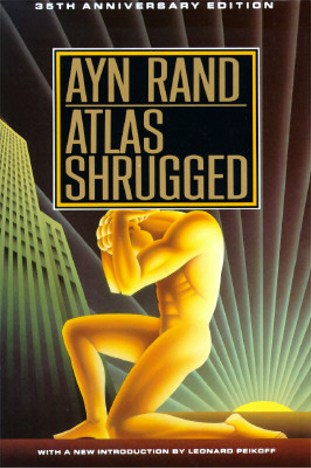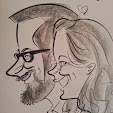
Atlas Shrugged is not a small book in any way. It's hefty. It's a veritable tome. My version has nearly 1100 pages, and each page is packed with chunky paragraphs in 8 point font. Additionally, the themes of Shrugged are pretty weighty themselves. It took me the better part of a year to get through this volume, and that's more because of the second fact than it is the first. The book's messages about free will and independence are delved into with incredible depth, and nearly every page demands that the reader sit back and reflect on its contents. At its base, though, lies a simple Good Vs. Evil conflict, where the heroes overcome enormous obstacles to save the world from disaster. There is mystery, intrigue, and foreshadowing. But the good guys are industrialists and the bad guys are lazy freeloaders and bureaucrats. It's an economics epic where the author pushes its philosophical message so far that it cannot be received as Just A Story. The book centers around its title metaphor, that of the great minds of the country going on strike and shrugging off the weight of a world that takes advantage of their successes and punishes them for their virtues. It's heady stuff, and it demands a heady response. While Shrugged's metaphor is poignant, especially during a time when the government is bailing out banks, owning car companies and firing executives, I still have some problems with how it's used in this book. Examples follow.
Atlas Skipped Sunday School
Rand goes out of her way to denounce the "mystics" of religion. Sharing, giving, and charity are all denounced strongly, on any level of interaction. But it goes further than that. Some basic immoral acts such as adultery are lifted up as triumphs of Rand's philosophy. The man who commits it feels guilt, and that guilt is considered, by the text, to be his great flaw. The woman he commits adultery with, Dagny Taggart, the main character of the book, has sexual relations with three different men--all considered to be exemplars of Rand's philosophy. Examples of sexual promiscuity and infidelity are tied uncomfortably to the rest of Rand's philosophy, and she goes out of her way to make those connections, and to justify them.
Atlas Didn't Know When To Shut Up
A lot of this book is abstraction. Probably 1247 pages of this 1100 page book are devoted to describing every philosophical nuance of a look or a stance or a thought. Adjectives aren't good enough for Rand. People look like extensive metaphors and feelings--everybody embodies some kind of philosophy, whether it's the way they drink their coffee or the way they cook food. It adds depth. It can also grate my freaking nerves after awhile. Like after an entire page. The worst, though, is a 60 page monologue given by the fictional champion of Rand's philosophy. This is given near the 900 page mark, after all of the events of the plot have illustrated Rand's theme. But that's not enough. She needs 60 pages straight of dialogue, all from one single character, to punctuate it. It's the single greatest example of breaking the Show versus Tell rule I've encountered. Not only does this guy outright state what's already been shown, he's also outright stating what many characters have already outright stated. Even worse, he outright repeats himself nearly the entirety of the monologue. We get it. The book's long enough already.
Atlas Ruled Candyland
One of the reasons that Rand's philosophy comes forward so strongly and clearly in Shrugged is the fact that the entire setting is devised to do so. The antagonists of the novel, the bureaucrats, politicians, and lazy people, are clumsily crafted caricatures. While it's true that the things they do and the things they believe are all too often represented in our real world, these characters are almost insultingly flat. They are better suited to warding off fowl than they are to representing human beings.
Rand works hard to condemn the existence of gray in her black-and-white view of life, but she does so through a novel which presents a black-and-white reality. Obviously, this is a problem intrinsic to her medium--we cannot comprehensively prove anything about reality through fiction, but that is especially true when that fiction is pointed towards proving a specific thing. So while Rand's allegory is intelligent and poignant, it still suffers from the fact that it is, after all, just an allegory.
Final Thoughts
In the end, this is a must-read. The only reason that I needed to summarize my criticisms of the book is because the book forced me to. Shrugged is so well thought out that, in order to really read the book, you have to digest what it's saying, page by page, and look at what you really think. I don't agree with it all. But the victory of Shrugged is that I have to make that decision. The book takes itself so seriously that you have to, too. You have to decide when it takes itself too seriously, and when it's speaking truth. By the end, I found myself considering a lot of my own philosophies. I didn't buy it all, and while Rand may say that I failed her book, I still think that Atlas Shrugged wins a victory.

No comments:
Post a Comment